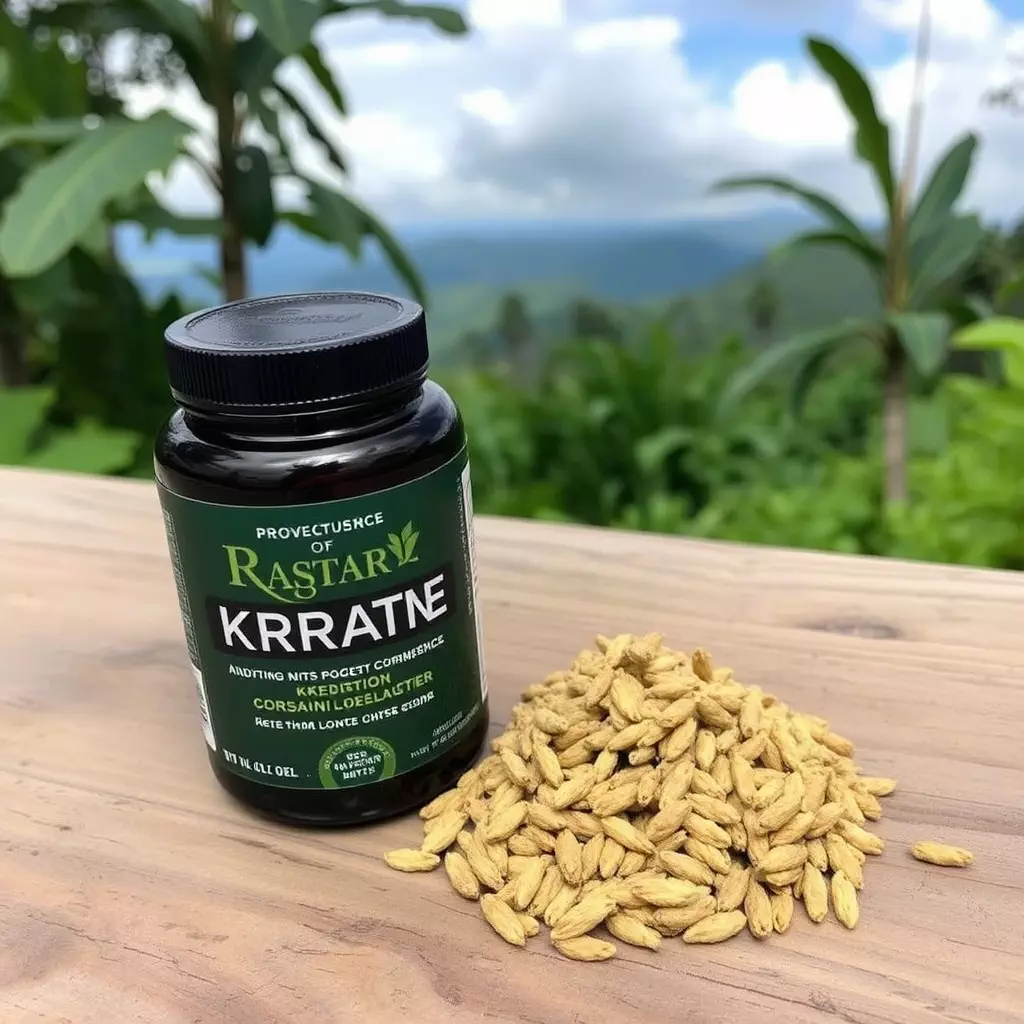Kratom, a plant extract from Southeast Asia, has been studied for its potential benefits on cardiovascular health. Its active compounds, mitraphylline and 7-hydroxymitragynine, may improve heart function by influencing heart rate variability and endothelial function, which could help manage blood pressure and heart rate. These alkaloids also exhibit anti-inflammatory and antioxidant properties that might reduce atherosclerotic plaques and vascular inflammation, potentially lowering the risk of cardiovascular events. The integrative health approach includes using a diffuser with 'thieves' essential oil blend, known for its immune-boosting qualities, to create a supportive atmosphere that may complement the wellness benefits for the heart. However, it is crucial to consult healthcare providers before starting any new health practice, including kratom use or aromatherapy with diffusers, to ensure safety and appropriateness for individual health needs. The scientific community emphasizes the need for more clinical research to fully understand kratom's effects on cardiovascular health and to establish clear guidelines. For those interested in exploring kratom as a supplement, it is essential to do so under medical supervision, especially considering the FDA's safety concerns and potential interactions with other medications. A balanced lifestyle that includes proper nutrition, exercise, and stress management is key to supporting cardiovascular health alongside any new treatment or supplement regimen.
Exploring the intersection of natural wellness and cardiovascular health, this article delves into the potential benefits of Kratom, a botanical substance gaining attention for its health-supportive properties. While traditionally known for its invigorating effects, recent research suggests that certain compounds in Kratom may contribute positively to heart health. We will examine these compounds and discuss how they might be integrated into a holistic cardiovascular wellness plan, considering safe practices and individual considerations. Join us as we uncover the promising role of Kratom in promoting optimal cardiovascular function, a topic that merits attention for those interested in maintaining or improving heart health alongside conventional health measures.
- Unveiling the Potential of Kratom for Enhanced Cardiovascular Well-Being
- Kratom's Role in Cardiovascular Health: A Closer Look at Its Beneficial Compounds
- Integrating Kratom into Your Cardiovascular Health Regimen: Safe Practices and Considerations
Unveiling the Potential of Kratom for Enhanced Cardiovascular Well-Being

Kratom, a plant from Southeast Asia’s Mitragyna speciosa, has garnered attention for its potential health benefits, with a growing body of research exploring its effects on cardiovascular well-being. Preclinical studies suggest that kratom may offer protective cardiac effects due to its active components, including mitraphylline and 7-hydroxymitragynine. These compounds have been observed to influence heart rate variability and improve endothelial function, which could translate to better management of blood pressure and heart rate in individuals. Moreover, the anti-inflammatory and antioxidant properties present in kratom may contribute to the reduction of atherosclerotic plaques and the amelioration of vascular inflammation, potentially reducing the risk of cardiovascular events. While these findings are promising, it is crucial for further clinical trials to elucidate the precise mechanisms and safe dosages to confirm kratom’s role in supporting cardiovascular health.
Incorporating kratom into a holistic health regimen, possibly alongside complementary practices such as using a diffuser with essential oils like those found in the ‘thieves’ blend, may offer synergistic benefits for cardiovascular health. The ‘thieves’ oil, known for its purported immune-boosting properties, can be diffused to promote a relaxing environment and enhance overall wellness. This integrative approach, combining natural supplements with aromatherapy, could potentially contribute to a comprehensive strategy aimed at maintaining a healthy cardiovascular system. As always, it is essential to consult with healthcare professionals before incorporating any new substance or therapy into one’s health routine to ensure safety and appropriateness for individual health needs.
Kratom's Role in Cardiovascular Health: A Closer Look at Its Beneficial Compounds

Kratom, a tropical evergreen tree native to Southeast Asia, has garnered attention for its potential impact on cardiovascular health. The leaves of kratom contain alkaloids, such as mitragynine and 7-hydroxymitragynine, which have been studied for their effects on the heart and blood vessels. Preclinical studies suggest that these compounds may improve heart function by stimulating the heart muscle and regulating blood pressure. Additionally, kratom alkaloids are believed to exhibit antioxidant properties, which can protect the cardiovascular system from oxidative stress and inflammation, factors that contribute to the development of heart disease.
Furthermore, the potential role of kratom in enhancing cardiovascular health extends to its anti-thrombotic effects. By promoting blood flow and preventing clot formation, kratom may help reduce the risk of stroke and heart attack. However, it is crucial for individuals considering kratom as part of their health regimen to approach its use with caution. The FDA has issued warnings regarding the safety of kratom, highlighting the need for more research to understand its mechanisms fully and determine safe dosages. As such, individuals should consult healthcare professionals before incorporating kratom into their routine, especially given the potential for interactions with other medications and its effects on various body systems. The diffuser Thieves Oil, known for its natural ingredients, may complement a holistic approach to cardiovascular wellness when used as directed in conjunction with proper medical advice and guidance.
Integrating Kratom into Your Cardiovascular Health Regimen: Safe Practices and Considerations

Kratom, a plant from Southeast Asia with leaves that contain compounds which can have various effects on the body, has been the subject of increasing interest in the realm of natural supplements for cardiovascular health. When considering integrating kratom into your regimen for heart health, it is imperative to approach its use with caution and informed decision-making. One must be mindful of the appropriate dosage and frequency as recommended by healthcare professionals. Additionally, it is crucial to consult with a qualified medical practitioner before incorporating kratom into any treatment plan, especially if you have pre-existing health conditions or are taking other medications.
For those who opt for kratom as part of their cardiovascular wellness strategy, safe practices and considerations must be top priority. The method of consumption plays a significant role in safety and efficacy. For instance, some prefer kratom in capsule form, while others may use it with a diffuser thieves blend, which is designed to enhance the experience and potentially augment its health benefits. It is important to source high-quality kratom products from reputable vendors to ensure purity and safety. Moreover, maintaining a balanced lifestyle that includes regular exercise, a heart-healthy diet, adequate hydration, and stress management complements the use of kratom for optimal cardiovascular health outcomes. Always prioritize a holistic approach that respects the complexities of individual physiology and the importance of professional guidance in navigating the integration of kratom into your health regimen.
In conclusion, the exploration of kratom’s potential in supporting cardiovascular health presents a promising avenue for individuals seeking natural supplements. The examination of its beneficial compounds and their impact on heart health underscores the importance of a holistic approach to wellness. While integrating kratom into one’s regimen requires careful consideration and adherence to safe practices, as detailed in the section on responsible use, the insights gained from this research are indicative of kratom’s potential role in promoting overall cardiovascular health. It is clear that further studies are warranted to fully elucidate these effects. For those interested in alternative remedies, such as diffuser blends inspired by the Thieves oil formula, it is encouraged to consult healthcare professionals and consider all available evidence before making any changes to one’s health regimen.






